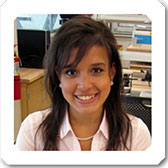
Interview:
Nelsy Hernandez from Venezuela is a senior majoring in Mechanical Engineering at Marquette University in Milwaukee, Wisconsin.
Why did you decide to study in the USA?
I decided to study in the USA because I was familiar with the education system; I lived in Philadelphia and Houston for a year each during which I attended school for 3rd grade and 6th grade. Additionally, the USA provided an environment for a secure, prosperous, progressive, stable and innovative lifestyle and career development.
Why did you choose Marquette University?
In Venezuela, I had a college advisor who helped me select and apply for universities. I chose Marquette University due to its student population size, highly regarded Engineering program and Engineering Co-op program. Marquette is not too large in student population such that you would feel as though you were immersed in a city. At Marquette, you can walk around campus and greet friends and professors on your way, while still feeling that the university is big enough to have a variety of colleges and cultures.
The Co-op program was my deciding factor for choosing Marquette University. As undergraduate engineering students, we are able to gain work experience and apply our academic engineering knowledge in industry. The program alternates full-time work with full-time academic semesters. This is an extremely valuable experience because it allows the student to understand the engineering industry and helps identify areas of interest.
Marquette University is a special place because of the passion that every individual, student, faculty, and staff has to serve the community around them both within the university and throughout Milwaukee. This spirit of service shines through everyone's personality. They make you feel part of a greater purpose, in which you have a considerable influence.
What do you like best?
The camaraderie that exists within the Marquette community is my favorite characteristic. Whether you participate in a student, cultural, social organization or within your academic college, you are sure to find a family.
What do you miss most?
I miss the lack of social taboos that exist in Venezuelan society, specifically in regards to race, religious, economic and political views. There are more social stigmas within U.S. culture that makes people over analyze each other's intentions.
What was your biggest surprise?
Due to the vast size of the country, food in the U.S. is mostly mass-produced, while in Venezuela most foods are organic and locally produced.
In regards to education, my biggest surprise was the thirst for knowledge and passion for learning that every student seems to possess. There is a strong desire for future economic security that drives intellectual growth and enrichment.
... your biggest disappointment?
I was disappointed by the fact that most U.S. citizens that I have encountered do not seem to know much about the news, history, geography or culture of other countries.
How have you handled: ... language differences?
You have to keep in mind that you are not expected to know every term in the English language, and that it is okay to ask questions when you do not know the meaning of a certain phrase, word or acronym.
... finances?
My dad financed my education. I also obtained a scholarship from Marquette University, which covered a certain amount every semester for eight semesters. Additionally, I worked for the College of Engineering while I was studying and participated in the co-op program, which allowed me to have a salary. All these combined allowed me to finance tuition, living, and social expenses.
... adjusting to a different educational system?
The biggest factors that have allowed me to adjust was being very attentive in class, asking for help from fellow students and classmates, visiting professors' office hours to ask for assistance and trusting my organization and learning abilities.
What are your activities?
I am a member of Pi Beta Phi, a fraternity for women, and Pi Tau Sigma Mechanical Engineering Honor Society. In the past I was part of Marquette's club rugby team and the Marquette University Spacecraft Engineering team (M.U.S.E).
How easy or difficult was making friends?
It depends on the type of people you encounter. People are different everywhere you go, regardless of the culture to which you are exposed. It has been hard to keep in mind the cultural differences and how some people can misinterpret your personality or intentions; however, when you are confident in who you are and stay true to your personality making friends becomes a matter of being comfortable with others getting to know you and you getting to know others.
How relevant is your U.S. education to your personal goals and to the needs of your country?
My main career goal is to be an innovative, creative, versatile, and analytical engineer with a continuous drive for progress and a healthy dissatisfaction with the conventional. I want to contribute my different cultural perspectives to industry and facilitate cultural diversity.
U.S. education has shaped my drive and motivation for success and to pursue my career goals. It has taught me that you can truly attain the goals you set for yourself as long as they are realistic and you are willing to work hard to accomplish them. U.S. education has also shown me that the needs of Venezuela can be satisfied if people are taught the importance of education and the value and fruits of hard work and perseverance.
What is your advice to other students who are considering a U.S. education? Do it. It is an invaluable experience that will expose you to a different culture, different ideals, values, and worldviews. The U.S. is a country enriched with a variety of cultures (European, Asian, Latin American, etc.) and each one contributes different perspectives, worldviews, and helps advance the country in different ways. Being exposed to such cultures and worldviews will shape the way you also see the world and will open doors to new opportunities, career and personal goals, and solutions to local and global issues.

























